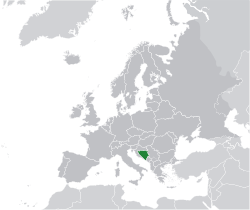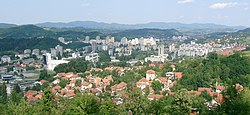Bosnia And Herzegovina: Country in Southeast Europe
Bosnia and Herzegovina (Serbo-Croatian: Bosna i Hercegovina / Босна и Херцеговина, pronounced ), abbreviated BiH (БиХ) or B&H, sometimes called Bosnia–Herzegovina and often known informally as Bosnia, is a country in Southeastern Europe, located in the Balkans with an area of 51,197 km2 and 4,600,000 people.
Countries around Bosnia and Herzegovina are Croatia, Serbia and Montenegro. The capital is Sarajevo, and other important cities are Banja Luka, Mostar, Bihać, Zenica and Tuzla. The three largest ethnic groups are Bosniaks, Serbs, and Croats. Most Bosniaks are Sunni Muslim, most Serbs are Serbian Orthodox Christians, and most Croats are Roman Catholic. The majority religion is Islam.
Bosnia and Herzegovina Bosna i Hercegovina Босна и Херцеговина | |
|---|---|
| Anthem: Državna himna Bosne i Hercegovine Државна химна Босне и Херцеговине ("National Anthem of Bosnia and Herzegovina") | |
 Location of Bosnia and Herzegovina (green) on the European continent (dark grey) | |
| Capital and largest city | Sarajevo 43°52′N 18°25′E / 43.867°N 18.417°E |
| Official languages (state level) | None |
| Official languages (entity level) | Bosnian Serbian Croatian |
| Demonym(s) | Bosnian, Herzegovinian |
| Government | Federal parliamentary republic |
| Christian Schmidta | |
| Denis Bećirovićd | |
| Željka Cvijanovićb Željko Komšićc | |
| Borjana Krišto | |
| Legislature | Parliamentary Assembly |
| House of Peoples | |
| House of Representatives | |
| Establishment history | |
• Bosnia (early medieval polity) | 10th century |
• Banate of Bosnia | 1154 |
| 1377 | |
• Ottoman conquest | 1463 |
• Austro-Hungarian conquest and 1908 annexation | 1878 |
| 1 December 1918 | |
• ZAVNOBiH | 25 November 1943 |
• SR Bosnia and Herzegovina within SFR Yugoslavia | 29 November 1945 |
• Independence from Yugoslavia | 3 March 1992 |
• Washington Agreement | 18 March 1994 |
• Dayton Agreement | 14 December 1995 |
| Area | |
• Total | 51,129 km2 (19,741 sq mi) (125th) |
• Water (%) | 1.4% |
| Population | |
• 2021 estimate | 3,824,782 (130th) |
• 2013 census | 3,531,159 |
• Density | 69/km2 (178.7/sq mi) |
| GDP (PPP) | 2022 estimate |
• Total | |
• Per capita | |
| GDP (nominal) | 2022 estimate |
• Total | |
• Per capita | |
| Gini (2015) | medium · 47th |
| HDI (2019) | high · 73rd |
| Currency | Convertible mark (BAM) |
| Time zone | UTC+01 (CET) |
• Summer (DST) | UTC+02 (CEST) |
| Date format | d. m. yyyy. (CE) |
| Driving side | right |
| Calling code | +387 |
| ISO 3166 code | BA |
| Internet TLD | .ba |
History
The first state in modern-day Bosnia and Herzegovina was in the Middle Ages. After the conquest of Bosnia by the Ottoman Empire in the 15th century, Islam was introduced to the local population. During the Ottoman Empire, it was a very important province in the Balkans and the capital, Sarajevo, had 100,000 people. In the Russo-Turkish War (1877–1878), Austria-Hungary occupied Bosnia and Herzegovina and annexed it in 1908. In 1914 the Archduke Ferdinand and his wife, Sophie, were assassinated in Sarajevo, leading to World War I. From 1918 until 1992, the country was a part of Yugoslavia. After a 3-year long war, part of the Yugoslav Wars, Bosnia and Herzegovina proclaimed independence as a country consisting mostly of Serbs, Croats and Bosnian Muslims.
Divisions
The country is divided into two entities: Federation of Bosnia and Herzegovina and Republika Srpska. The Federation of Bosnia and Herzegovina is then divided into 10 cantons. Both entities are divided into municipalities. The Brčko District is not part of either entity. Officially, it is governed by both together.
Cities

This is a list of the ten largest towns in Bosnia and Herzegovina. Only Sarajevo and Banja Luka have more than 200,000 people.
| Name of municipality | Population | |
|---|---|---|
| 1. | Sarajevo | 460,000 |
| 2. | Banja Luka | 250,000 |
| 3. | Tuzla | 131,640 |
| 4. | Zenica | 127,105 |
| 5. | Bijeljina | 115,692 |
| 6. | Mostar | 111.186 |
| 7. | Prijedor | 105.000 |
| 8. | Brčko | 82.000 |
| 9. | Doboj | 80.000 |
| 10. | Bihać | 61.287 |
Sports
Bosnia and Herzegovina has produced many athletes. Many of them were famous in the Yugoslav national teams before Bosnia and Herzegovina's independence.
The most important international sporting event in the history of Bosnia and Herzegovina was the hosting of the 14th Winter Olympics, held in Sarajevo.
The Borac handball club has won seven Yugoslav Handball Championships, as well as the European Championship Cup in 1976 and the International Handball Federation Cup in 1991.
The Bosna basketball club from Sarajevo were European Champions in 1979. The Yugoslav national basketball team medaled in every world championship from 1963 through 1990. The team included Bosnian players such as Dražen Dalipagić and Mirza Delibašić. Bosnia and Herzegovina regularly qualifies for the European Championship in Basketball. Jedinstvo Aida women's basketball club, based in Tuzla, has won the 1989 European Championships in Florence.
Bosnia has many world-class basketball players, notably Mirza Teletović, the first Bosnian in the NBA. Among others are, Elmedin Kikanović, Nihad Đedović, Ognjen Kuzmić, Jusuf Nurkić, Nedžad Sinanović, and Nemanja Mitrović.
The Tuzla-Sinalco karate club from Tuzla has won the most Yugoslav championships, as well as four European Championships and one World Championship.
The Bosnian chess team has been Champion of Yugoslavia seven times. In addition the club ŠK Bosna Sarajevo won four Chess Club Cup : 1994 in Lyon, 1999 in Bugojno, 2000 in Neum, and 2001 in Kallithea Elassonos. Chess grandmaster Borki Predojević has also won European Championships: Under-12 years Litochoro (Greece) in 1999, and Under-14 years Kallithea Elassonos (Greece) in 2001, and in 2003 won World Championship Under-16 years Halkidiki (Greece).
Middle-weight boxer Marijan Beneš has won several Championships of Bosnia and Herzegovina, Yugoslav Championships and the European Championship. In 1978 he won the World Title against Elisha Obed from the Bahamas. Another middle-weight boxer, Anton Josipović won the Olympic Gold in Los Angeles, 1984. He also won Yugoslav Championship in 1982, the Championship of the Balkans in 1983, and the Belgrade Trophy in 1985.
Association football is the most popular sport in Bosnia and Herzegovina. It dates from 1903, but its popularity grew significantly after World War I. At the local level, FK Sarajevo (1967 and 1984), Željezničar (1972) have both won the Yugoslav Championship. The former Yugoslav national football team has included a number of Bosnian players, such as Josip Katalinski, Blaž Slišković, Dušan Bajević, Enver Marić, Mehmed Baždarević, Ivica Osim, Safet Sušić, Vahidin Musemić and Mirsad Fazlagić.
Today, the team of Bosnia and Herzegovina has modern footballers like Edin Džeko, Zvjezdan Misimović, Vedad Ibišević, Emir Spahić, Asmir Begović, Miralem Pjanić, Sejad Salihović, Senad Lulić and others. The independent Bosnia and Herzegovina national football team has not qualified for a European or World Championship but has played twice in the play-off stages.
Bosnian national teams have struggled to draft the best national players. Many players born in Bosnia and Herzegovina choose to play for other countries because of their ethnic identification. For example, Nikica Jelavić and Vedran Ćorluka were both born in Bosnia and Herzegovina but play for Croatia. Other internationally famous players from Bosnia and Herzegovina, who have made similar choices, are: Dejan Lovren, Mladen Petrić, Mario Stanić, Neven Subotić, Zlatan Ibrahimović, Marko Marin, Boris Živković, Zlatko Junuzović, Savo Milošević, and Zdravko Kuzmanović.
Bosnia and Herzegovina was the world champion of volleyball at the 2004 Summer Paralympics and 2012 Summer Paralympics. Many among those on the team lost their legs in the Bosnian War.
Cuisine
Bosnian cuisine uses many spices, in moderate quantities. Most dishes are light, as they are cooked in lots of water. The sauces are fully natural, with little more than the natural juices of the vegetables in the dish. Typical ingredients include tomatoes, potatoes, onions, garlic, peppers, cucumbers, carrots, cabbage, mushrooms, spinach, zucchini, dried beans, fresh beans, plums, milk, paprika and cream called Pavlaka. Bosnian cuisine is balanced between Western and Eastern influences. As a result of the Ottoman administration for almost 500 years, Bosnian food is closely related to Turkish, Greek, and other former Ottoman and Mediterranean cuisines. However, because of years of Austrian rule, there are many influences from Central Europe. Typical meat dishes include mostly beef and lamb. Some local specialties are ćevapi, burek, dolma, sarma, pilaf, goulash, ajvar and a whole range of Eastern sweets. Local wines come from Herzegovina where the climate is suitable for growing grapes. Herzegovinian loza (similar to Italian Grappa but less sweet) is very popular. Plum or apple alcohol beverages are made in the north. In the south, distilleries used to produce vast quantities of brandy. Brandy is the base of most alcoholic drinks.
Coffeehouses, where Bosnian coffee is served in džezva with rahat lokum and sugar cubes, are in many places in Sarajevo and every city in the country. Coffee drinking is a favorite Bosnian pastime and part of the culture. Bosnians are believed to be some of the heaviest coffee drinkers in the world.
Related pages
References
Other websites
 Media related to Bosnia and Herzegovina at Wiki Commons
Media related to Bosnia and Herzegovina at Wiki Commons Bosnia and Herzegovina travel guide from Wikivoyage
Bosnia and Herzegovina travel guide from Wikivoyage
This article uses material from the Wikipedia Simple English article Bosnia and Herzegovina, which is released under the Creative Commons Attribution-ShareAlike 3.0 license ("CC BY-SA 3.0"); additional terms may apply (view authors). Content is available under CC BY-SA 4.0 unless otherwise noted. Images, videos and audio are available under their respective licenses.
®Wikipedia is a registered trademark of the Wiki Foundation, Inc. Wiki Simple English (DUHOCTRUNGQUOC.VN) is an independent company and has no affiliation with Wiki Foundation.


